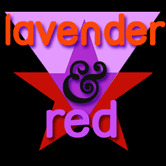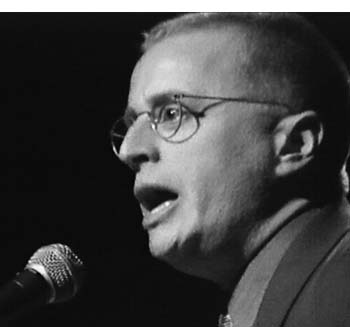



Sunday, June 29, saw a lull between the battles [of the Stonewall Uprising], although many cops were patrolling the streets of the Village, hurling slurs at those milling on the corners and sidewalks, reportedly trying to egg on skirmishes.


Leslie Feinberg speaking for freedom for Mumia Abu-Jamal, Town Hall, New York City, 1999. (WW Photo: D. Stapp Griswold)
As thousands of gays and lesbians — drawing to their leadership and ranks people of color, trans people, street youths — had waged pitched battles with the cops on Friday and Saturday during the early nights of the Stonewall Uprising, a fault line of political difference opened visibly wide between those who had the least to lose and the most to gain from fighting back, and those who favored not rocking the boat.
The tony crowd soaking up a little sun in the Hamptons and Fire Island Pines either ignored news of the rebellion or, as historian Martin Duberman noted, tended to condemn it as “regrettable.”
The Mattachine Society had posted a sign on the Stonewall Inn reading: “We homosexuals plead with our people to please help maintain peaceful and quiet conduct on the streets of the Village.” Mattachine-New York, according to historian David Carter, “after talking to the mayor’s office and the police, joined police efforts to stop the protests. . . . Mattachine officials came to the Stonewall Inn and talked to people who showed up in an attempt to discourage them from protesting.”
This was a far cry from the early days of the first Mattachine [Society] in California at the height of the Cold War 1950s, when communists and other revolutionaries led grassroots organizing to confront widespread police entrapment and brutality against gay men and the Chicanx/Mexicanx communities.
‘No longer submissive’ to cops
However, a bodacious group of gay youths descended on the Sixth Precinct and plastered the police cruisers, a police arrest van and the personal cars of police officers with luminescent fuchsia and blue bumper stickers, demanding “Equality for Homosexuals.”
Throughout the Village, teams made up of one male and one female passed out leaflets issued by the Homophile Youth Movement that demanded: “Get the Mafia and the Cops Out of Gay Bars.”
Assessments of the changed mood of the LGBTQ population on Christopher Street were voiced from two antithetical directions.
Deputy Inspector Pine, who led the initial raid on the Stonewall Inn, made a remark insulting those who showed individual courage, defiance and resistance in the face of police arrest and imprisonment, beatings and torture.
Nevertheless, his words documented a dramatic overall shift in mass mood in the LGBTQ population: “For those of us in public morals [sic], things were completely changed … suddenly they were not submissive any more.”
Gay male poet Allen Ginsberg visited the Stonewall Inn on Sunday night with Village Voice reporter Lucian Truscott. His later observation to Truscott contains a word that inflicts wounds when used by an anti-gay bigot. Yet speaking about his own community with tender pride, he wrote about the sea change he witnessed: “You know, the guys there were so beautiful — they’ve lost that wounded look that fags all had 10 years ago.”
Rage still smoldering
Carter assembled the following firsthand accounts of incidents on Monday through Wednesday from participants. Monday and Tuesday nights were mostly quiet in the Village, as rain soaked the streets.
Police who tried to pick fights, however, were met with bold responses.
When one arrogant cop at Christopher Street and Waverly Place twirled his nightstick and hurled insults in the direction of passersby, an individual described as a “wildly ‘femme’ queen” lit the fuse of a firecracker and detonated it under his feet. The cop landed on his ass on the sidewalk.
The cop shouted and flailed with his club. When the same militant individual tossed another firecracker at him, the crowd fought with the cop and was able to snatch his badge off his uniform.
On Wednesday night, widespread street fighting resumed.
That was the night the Village Voice coverage of the early events in the Stonewall Rebellion hit newsstands. Some community members were so enraged by the anti-gay tone of the journalists that they debated torching the Voice’s offices that evening.
Carter states: “The second reason that rioting resumed in full force on Wednesday is because various radical Left groups came to protest.”
Participant Bob Kohler recalled: “There were more people rioting that could not be easily categorized, and a lot of that had to do with people that came over from other areas. The straight movement moved in heavily that night as a support.”
The left wing of ‘gay liberation’
Reports of those of all sexualities who came in support included members of the Black Panther Party, Workers World Party, the Yippies, a group that called itself the Crazies and other self-identified leftists.
In reality, these were parties and organizations [that already had] memberships of diverse sexualities. And many of the LGBTQ people who fought the cops at Stonewall also self-identified as leftists and revolutionaries.
Struggle erupted around 10 p.m. A chanting crowd, estimated at 500 strong, met a motorcade of police with a shower of bottles.
Police used their nightsticks to beat back the crowd. Eyewitness Ronnie De Brienza described seeing a friend pummeled by police and dragged off to a patrol car under arrest. “This was it,” he said. “From nowhere the crowd swelled to an estimated thousand, and the battle was on.”
Those who were there that night describe the battle between police and protesters as ferocious. Once again, eyewitnesses explain, it was the most oppressed who led the struggle. Unarmed protesters fought hard and bravely against police — who were well-protected by equipment and armed to the teeth.
Dick Leitsch, Mattachine-New York leader, observed that night that bodies of Stonewall combatants wounded in battle lay on the streets and sidewalks on Seventh Avenue South between Christopher and West 10th Streets.
He concluded: “Young people, many of them queens, were lying on the sidewalk, bleeding from the head, face, mouth and even the eyes. Others were nursing bruised and often bleeding arms, legs, backs and necks.”
Within roughly an hour, the fighting ended. But the battles fought by the most oppressed and most militant layers of the LGBTQ population paved a new road toward revolutionary struggle, with the left wing of “gay liberation” at every barricade.
The epic struggle of the Palestinian people against the full weight of U.S. imperialism and…
The following report comes from the Bronx Anti-War Coalition organizers on a protest held in…
In the Canadian federal elections held on April 28, the Liberals won with 169 seats…
The following is Part 2 of a talk given by the author to a meeting…
Boston Students, professors and workers are confronting the Trump administration’s fascist crackdown at universities across…
Philadelphia Within days of Swarthmore students reviving a pro-Palestinian encampment on April 30, police arrested…